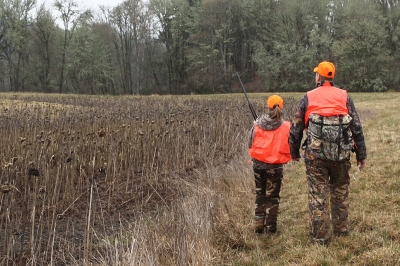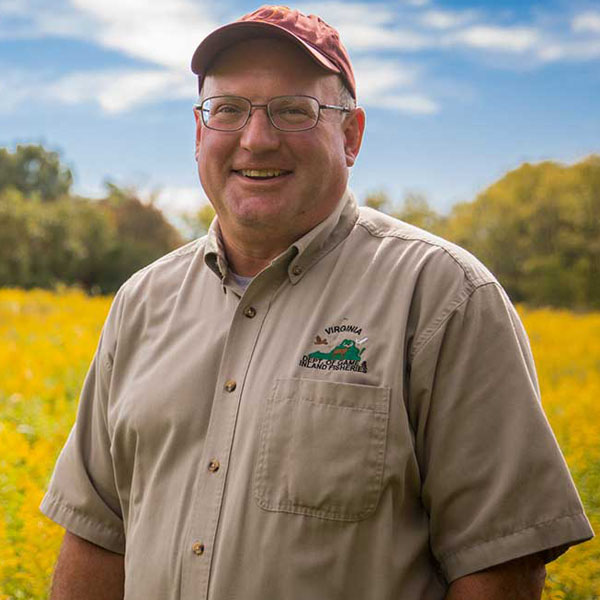In the hustle of a very busy fall…one where I took on more than my aging mind can handle…a peaceful morning in the woods before sunrise with a brand new squirrel hunter was good medicine. For the fourth year now, I participated in the Hunter Skills Weekend sponsored by the Virginia Hunters Education Association this September 24th. My role was that of squirrel hunting guide. I am now mostly an upland game bird hunter by choice. And those of us who follow bird dogs through thickets all day, rarely need to be in the woods before the sun comes up. It’s easy to forget how special that hour is where darkness transitions to day, and the hidden becomes known.
Well into young adulthood, I pursued squirrels with passion. There were few things I enjoyed more. Back in the 70s there were multiple squirrel seasons, and in southwest Virginia, ours began on September 15th, unless a Sunday, in which case it began the next day. Known as the early squirrel season, or just “early squirrel” to those who hunted them, it was a fine time for hickory shavings and white oak acorns, with the occasional nut laden beech tree found…a favorite that would draw squirrels out of the hickory trees. The process was to scout the woods before the season, find new green cuttings under hickory trees and plan to come back before sunrise on the opener anxiously anticipating those leaf shaking gray and fox squirrels that were bound to show up as the sky began to lighten in the east.
To a kid, few things were more exciting than listening intently for that first rustle from above. Squirrel hunting, like deer hunting, is reliant on sound as much as sight to detect approaching game. And calling squirrels noisy is an understatement. They are more noticeable than a Harley-Davidson passing by a library. I looked forward to early squirrel second only to the opening day of the gun deer season…lying awake the night before each opener…more jittery than a mouse in a room full of cats. With any luck, that first day would be cool, clear and still…and this year for our mentored new hunters it was exactly that. As close to perfect as a rainbow after a late evening summer storm.
Having hunted now for five and a half decades I began to take for granted things like sunrises and squirrels. Prior to helping do my part for hunter recruitment…I had lost most of the excitement I used to feel before a newly minted season began. I found myself hunting less and less…perhaps in danger of becoming a lapsed hunter myself. At first the idea of taking someone into the woods that I had never met was daunting. Not just from a safety standpoint, but also from that of being an introvert. I have had to work at being more extroverted to do my job, but it still doesn’t come naturally. So who would I guide, and would we have a rapport?
What I did not anticipate was the re-found joy I would experience through these neophyte hunters. This year in particular my hunter’s excitement at their experience was clearly present in the smiles throughout the morning at each new revelation. Multiple aspects of being a life -long hunter were new to this hunter. He had hiked and camped in many rural areas…but he had never seen the world as a living part in the age old back and forth between predator and prey. Sounds take on new meaning, reading “sign” becomes a decider between success and failure. Though rarely true anymore…skill could be the difference between eating and not eating. I do not want to imply these same things cannot be true for those not hunting. I only state what I feel…what is true to me…that in this role the senses are sharpened by deep seated instincts buried by computer screens and corporate meetings and the evening news. And as I guided this new hunter I felt the dead weight of modern life sloughing off and my old self returning. And I saw in him a person I used to be.
Upland bird hunting is not always the best choice for a beginning hunter. The action can go from nothing more than walking a dog, to too fast and unsettling in seconds. Birds do not fly in predictable trajectories and in the excitement of the moment, gun barrels can pass in unsafe directions. Combine this with being hard to hit, and a young, or new hunter can become frustrated.
Now don’t let me lead you to believe squirrel hunting is easy. It is not, especially when mast crops are abundant and the leaves are still on the trees. But it is generally easier than other forms of hunting. On our hunt this year, we saw squirrels early, but they were moving and restless. They were also wary from having been hunted for a couple weeks. As this new hunter began to tune in to their sounds and movements, though, we began to come closer. And the moment came when my hunter made a clean kill on the first animal he had ever harvested. As a guide I never know how a person will react to this…as it is not to be taken lightly. In some ways it can be life altering. I in fact think it should be. The realization that a good bit of our food comes from an organism that lived and breathed at one point in time can increase appreciation for the food we have via the grocery store. There are also more and more new hunters who hunt specifically for the local wild food. I believe hunting, done ethically, is as organic and healthy as anything a person can do. And I urge those of you who are getting older like me and losing some of the spark you had for the outdoors as kid to consider taking a new hunter out. Even if you are primarily an upland bird hunter, a morning in the squirrel woods with a new hunter will be good for you and could be the seedling that grows a lifelong hunter.








